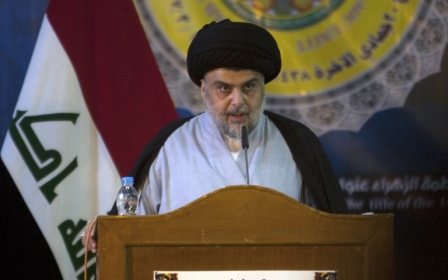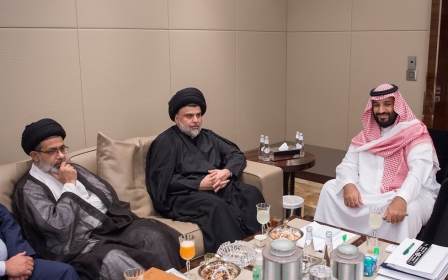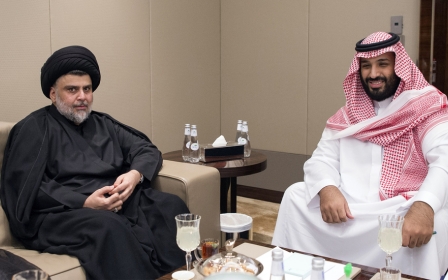Iraqi Shia cleric Sadr calls on government to disband Iran-backed militia
Influential Iraqi Shia cleric Muqtada al-Sadr on Friday called on the Baghdad government to dismantle the paramilitary Hashed al-Shaabi umbrella organisation dominated by Iran-backed Shia militias.
Sadr was speaking to thousands of supporters in the Iraqi capital, after a rare visit on the weekend to Sunni-ruled regional kingpin Saudi Arabia, a staunch rival of the Shia-dominated Islamic Republic of Iran.
In a speech broadcast on huge screens, Sadr urged Iraqi Prime Minister Haider al-Abadi to dismantle Hashed and "integrate into the army the disciplined members" of the paramilitary force, an AFP reporter said.
Sadr also called on authorities to "seize the arsenal of all armed groups".
In March, Sadr spoke to Middle East Eye in an exclusive interview, saying that all sectarian militias in Iraq should be disbanded.
"I'm afraid that the defeat of Daesh [Islamic State (IS) group] is only the start of a new phase. My proposal is inspired by fear of sectarian and ethnic conflict after Mosul's liberation," he said.
"I want to avoid this. I am very proud of Iraq's diversity, but my fear is that we may see a genocide of some ethnic or sectarian groups."
Last week he paid a visit to Saudi Arabia, with his office saying in a statement that the trip was in response to an "official invitation".
The official Saudi Press Agency published pictures of Sadr with Crown Prince Mohammed bin Salman in Jeddah, and said they discussed Saudi-Iraqi relations and "a number of issues of mutual interest".
On Friday, Sadr also banned anti-Saudi images, slogans and banners from Iraq's streets, local media reported. The claims could not be independently verified by Middle East Eye.
The Hashed al-Shaabi is nominally under Abadi's command, but some of its components have for years been sending fighters to support Damascus in its six-year-old conflict against various rebel factions.
The paramilitary force took part in the battle to retake Iraq's second city Mosul from IS, and could join future operations aimed at routing the militants from areas of the country they still hold.
IS still controls swaths of western Iraq, including much of the desert province of Anbar. Rival forces, which largely cooperated against the militants in Mosul, are expected to compete for shares of the spoils.
Sadr is now seen as a nationalist who has repeatedly called for protests against corruption in the Iraqi government, and his supporters have staged huge demonstrations in Baghdad calling for electoral reform.
On Thursday, Sadr issued a new call for protests in Baghdad and other cities to denounce "corrupt politicians" and demand reforms.
He had led a militia that fought against the US occupation of Iraq.
During 2005 and 2006 Sadr's self-styled Mahdi army was involved in sectarian killings that engulfed Baghdad. Hundreds of Sunnis were murdered by militias loyal to various Shia leaders. Hundreds of Shias were murdered in return.
Sadr put his Mahdi army on hold in 2007, keeping it in reserve for future use. When IS seized Mosul in June 2014, he brought it back under a new name, Saraya al-Salam (Peace Brigades).
Some 40,000 volunteers from the brigade are deployed north of Baghdad, mainly defending an important Shia shrine in Samarra.
Middle East Eye propose une couverture et une analyse indépendantes et incomparables du Moyen-Orient, de l’Afrique du Nord et d’autres régions du monde. Pour en savoir plus sur la reprise de ce contenu et les frais qui s’appliquent, veuillez remplir ce formulaire [en anglais]. Pour en savoir plus sur MEE, cliquez ici [en anglais].




